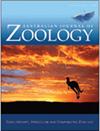The role of the foregut in digestion in the cricket Teleogryllus commodus and the locust Chortoicetes terminifera
IF 1
4区 生物学
Q3 ZOOLOGY
引用次数: 2
Abstract
Abstract The role of the foregut (crop and proventriculus) in mechanical processing of food has received little attention in insects. Using the Australian plague locust (Chortoicetes terminifera) and the black field cricket (Teleogryllus commodus) as models, the role of the crop in processing of wheat or rye grass was examined. Interior cuticular structures (spines) of the foregut were described using light and scanning electron microscopy, with locusts having sclerotised structures and crops of crickets being unsclerotised internally. Muscular bands on the exterior surface of the crop part of the foregut are similar in males of both species, but contractions and movements are more forceful in locusts. Passage rate from the foregut is much faster in locusts (<3 h) than in crickets (>3 h). Water within the crop is reduced compared with the water content of fresh grass within the foregut of locusts, but water is increased in cricket crops. Spines within the crops are small relative to the size of food particles in both species. Some spines of locusts contain metals. The slower passage rate from the crop of crickets may be limited by the proventriculus. Foregut structure and food processing facilitates the generalist diet of crickets, but may restrict locusts to consuming softer grasses.蟋蟀Teleogryllus commodus和蝗虫Chortoicetes terminifera前肠在消化中的作用
前肠(作物和前肠)在食品机械加工中的作用在昆虫中很少受到关注。以澳大利亚鼠疫蝗(Chortoicetes terminifera)和黑地蟋蟀(Teleogryllus commodus)为模型,研究了该作物在小麦或黑麦草加工中的作用。使用光学和扫描电子显微镜描述了前肠的内部角质层结构(棘),蝗虫具有硬化结构,而蟋蟀的作物内部未硬化。这两个物种的雄性前肠嗉囊外表面的肌肉带是相似的,但蝗虫的收缩和运动更有力。蝗虫的前肠通过速度要快得多(3小时)。与蝗虫前肠内新鲜草的含水量相比,作物内的水分减少,但蟋蟀作物中的水分增加。在这两个物种中,与食物颗粒的大小相比,作物内的刺都很小。蝗虫的一些刺含有金属。蟋蟀的传代速度较慢可能受到前室的限制。前肠结构和食物加工有利于蟋蟀的广泛饮食,但可能限制蝗虫食用较软的草。
本文章由计算机程序翻译,如有差异,请以英文原文为准。
求助全文
约1分钟内获得全文
求助全文
来源期刊
CiteScore
2.40
自引率
0.00%
发文量
12
审稿时长
>12 weeks
期刊介绍:
Australian Journal of Zoology is an international journal publishing contributions on evolutionary, molecular and comparative zoology. The journal focuses on Australasian fauna but also includes high-quality research from any region that has broader practical or theoretical relevance or that demonstrates a conceptual advance to any aspect of zoology. Subject areas include, but are not limited to: anatomy, physiology, molecular biology, genetics, reproductive biology, developmental biology, parasitology, morphology, behaviour, ecology, zoogeography, systematics and evolution.
Australian Journal of Zoology is a valuable resource for professional zoologists, research scientists, resource managers, environmental consultants, students and amateurs interested in any aspect of the scientific study of animals.
Australian Journal of Zoology is published with the endorsement of the Commonwealth Scientific and Industrial Research Organisation (CSIRO) and the Australian Academy of Science.

 求助内容:
求助内容: 应助结果提醒方式:
应助结果提醒方式:


